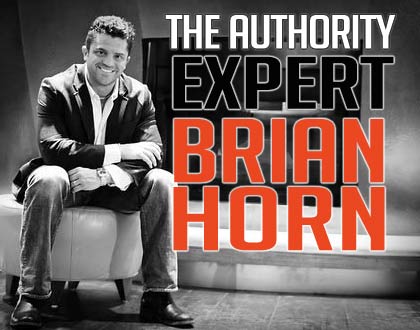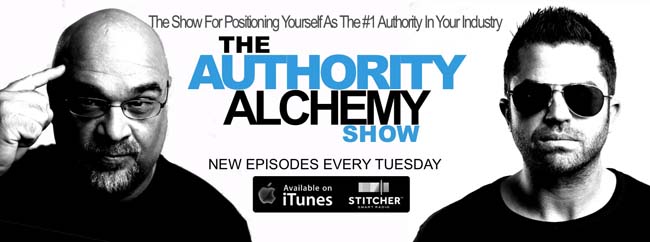Startups
6 Effective Ways To Become A Well Known Authority In Any Niche

Best-selling author and Authority Expert “Brian Horn” helps entrepreneurs and celebrities leverage their knowledge to gain authority status in their industry. Brian is a pro at amplifying his clients message and shows them how to convert their new audience into high paying customers.
Brian has been profiled and featured on ABC, CBS, NBC, Fox, Forbes, Advertising Age and Inc Magazine named Brian an “emerging business leader to watch.”
“Horn’s ability to make a client into the Google Authority of their niche is simply remarkable.”
I was fortunate enough to have the chance to interview the main man “Brian Horn” to discuss the many different ways that people can better position themselves to become a force to be reckoned with and an Authority in their niche’.
So let’s read on, as Brian shares his 6 Ways to become a well-known Authority in any field.
6 Ways To Become An Authority
1. Position yourself
Don’t just focus on getting more traffic, or getting more sales. Take it back a few steps. Instead, start positioning yourself as the educator and advocate for the success of your prospects and customers. So now and then, go back to that one statement and ask yourself “Am I educating my prospects and customers? Am I advocating for their successes?”
A great example of an authority would be “Richard Simmons“, he’s been active since the 70’s as a health and fitness personality. You see him online and on TV Infomercials, and sure he is funny and sometimes over the top but let’s look at 2 things that he does to position himself as the authority in his field:
– He is an educator: He puts out daily content in the form of e-mails and messages on his site, videos on a regular basis and he’s always cranking out new DVD’s.
– He is also an advocate: Unlike all the other fitness products that are usually showing fit people working out, Richard will spend a lot of his time sitting at the bed side of people who are so morbidly obese that they can’t get out of bed and he’s crying with them, showing them he understands what they are going through. He tells them that he was also a heavy guy before and he shows them he really cares about them by putting himself in their position.
2. Micro-specialize
You really need to refine what you’re offering. Get super specific about what you are offering, and who you are offering it to. That way you will also have less competition. Instead of offering, let’s say “Marketing Services” where you will be competing against the likes of Seth Godin and everybody else that is really well-known and big in that field, you specify that you, for example, will just help Small Businesses in the Health Care industry with their Facebook promotion. With something that specific, you have very little competition. You can become really good at it, you learn more and more about Facebook, how people in the Health Care industry talk, how they think, what their pains are and what makes them successful.
You have micro specialized yourself to be the expert for their needs.
3. Know that people don’t care how smart you are
A lot of people think they have to be smart to be an authority. People will try to impress others with their knowledge, when most people couldn’t care less about how smart you are. I do a lot of authority building with Dentists and Dr’s and one of the things I tell them is that “people do not care about the diploma on your wall, you need to get that completely out of your head.” Nobody calls the dentist’s office and says “Well…. what does his diploma say?“.
If people have paid a lot of money for education, events and info products, I’m all for that, that’s great but at the end of the day people just want to know whether or not you can help them.
4. Know your type
There are 4 different Authority types that we use to help people position themselves:
1. The Mr. Joe Every Man Type: The “I can do it, you can do it!” type of person.
2. The Cowboy: Someone like Gary Vaynerchuk. A little over the top, calls out, is controversial and likes to curse a lot.
3. The Soldier: A protector type of person. This works great within Financial industries and is represented through a Dave Ramsey or a Suze Orman personality. They appeal to people who have been beaten down by a situation and they are there to protect them. So a Suze Orman or Dave Ramsey type of person would say “The credit card industries are evil, they have ben praying on you but follow this simple advice and you will be protected from those bad guys“.
4. The Wizard: Someone who has a very specific type of knowledge that doesn’t try to push-off on other people or make them just like they are, they try to help others to become a little more like them.
Tony Robbins is like a wizard. Tony doesn’t say “Hey come to my events and you will be just like me“, there’s no way you are going to be like Tony, but you can use his teachings to be a little bit more like him, and a little bit of that rubs off on you to want to be better.
5. Quit buying lots of products
I see people all the time that say “Ok, I’m just going to read one more book, I am going to one more seminar“, just because they get that hit of Dopamine, they think they are doing something better.
It is much more effective to focus on your mindset, focus on getting a good strategy down that is repeatable and that you can expand with instead of buying all the products ‘YOU THINK YOU NEED’ before you can start.
6. Know that people love people with flaws
So we do this in two ways. 1. Is with back stories. So if you are a Mr.Joe Every Man Authority, you would be someone who has lost a lot of weight and is now a fitness advice person who says “Hey, I lost 300 pounds, now I’m fit and you can do it too“, or “Hey I was broke, living in my truck so I learned how to invest in Real Estate and now I’m a millionaire“. Those back stories work great because they show that they were a failure before and it resonates with a lot of people.
The 2nd way is by poking fun at your self and showing a little self-deprecation. Someone who is a great example of this is Oprah Winfrey, with her weight struggles. Oprah does a really good job at this, she talks very openly and honestly about it. She doesn’t try and hide it or tell people not to talk about it. People love that about her.
If you want to hear more great advice by Brian Horn on how to master the art of Authority then tune in to his podcast shows with Jack Mize, an Online Media Marketing Strategists for small business owners and local marketing consultants.
Shift Your Mindset
10 Powerful Traits Every True Thought Leader Possesses
In a world saturated with noise, thought leadership is the quiet power that shifts paradigms.

Thought leadership is more than just having strong opinions. It’s the ability to influence, inspire, and guide others by sharing original insights, innovative ideas, and deep domain expertise. It’s about sparking change, not just talking about it. (more…)
Startups
The Young Man’s Guide to Creativity: 10 Daily Habits to Improve Your Creative Mind
10 daily habits you can put into practice right now to improve your creativity

When I was 22 years old, I became a Top Writer on Medium.
It’s not an easy path. I lived in the Philippines and had never received a penny after writing over 100 digital articles. But I treated it like practice. If I couldn’t get other people to read my work for free, why would they trust me? (more…)
Startups
If You’re Not Reinventing Yourself, You’re Falling Behind! Here’s What To Do
Reinvention is the secret weapon of high performers.

Reinvention is the secret weapon of high performers.
Most careers follow a predictable script. You start at the bottom, climb the ranks, and eventually settle into something resembling stability. But the people who make the biggest impact, the ones who don’t just play the game but change it, break that script. They evolve. They shift. They reinvent. (more…)
Startups
The Silent Killer of Startups: This Might Be Draining Your Profits
If you are careless in managing your inventory, it can lead to a sudden depletion in cash flow

There are several issues in a startup, but if you are really careless in managing your inventory, it can lead to a sudden depletion in cash flow. Old, broken, and misplaced stock wastes space and profits. If inventories and storage aren’t managed properly, it hardly ever works.
-

 Success Advice4 weeks ago
Success Advice4 weeks agoThe One Mindset Shift That Made Me Irreplaceable At Work
-

 Scale Your Business4 weeks ago
Scale Your Business4 weeks agoWhy Smart Entrepreneurs Never Skip This One Business Expense
-

 Did You Know3 weeks ago
Did You Know3 weeks ago7 Surprising Life Lessons Video Games Taught Me That School Never Did
-

 Success Advice3 weeks ago
Success Advice3 weeks agoHow Playing by the Rules Became the Smartest Business Strategy
-

 Success Advice2 weeks ago
Success Advice2 weeks agoHow to Build Trust, Kill Micromanagement, and Lead a Team That Thrives
-

 Scale Your Business2 weeks ago
Scale Your Business2 weeks agoHow to Build a Workplace People Actually Want to Show Up To
-

 Success Advice2 weeks ago
Success Advice2 weeks agoSuccess Isn’t Sexy: 5 Daily Habits That Actually Work
-

 Scale Your Business2 weeks ago
Scale Your Business2 weeks agoHow Smart Entrepreneurs Cut Financial Chaos in Half with One Simple Switch































21 Comments